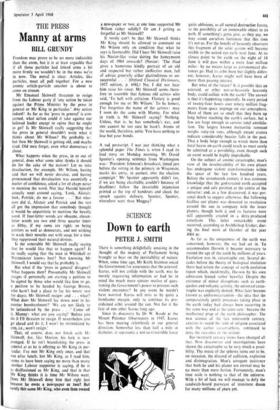Manny at arms
THE PRESS BILL GRUNDY
Freedom may prove to be no more indivisible than the atom, but it is at least arguable that if all those particles had linked arms a bit more firmly we wouldn't be in the mess we're in now. The moral is clear. Articles, like particles, must all pull together! For a new atomic article-particle smasher is about to come on stream.
Mr Emanuel Shinwell threatens to resign from_the Labour party if 'any action be taken against the Prime Minister by the press in general or Mr King in particular.' Any action indeed! As far as the 'press in general' is con- cerned, what action could it take against our beloved leader except to opine that he ought to go? Is Mr Shinwell really suggesting that the press in general shouldn't write what it thinks about Mr Wilson? He probably is: but then Mr Shinwell is getting old, and maybe tired. Old men forget, even what democracy is about.
What happens when the press, in or out of general, does what some idiot thinks it should do for the sake of the nation? Let us take devaluation, for example. Mr Wilson, having said that we will never devalue, and having pronounced that devaluation was essentially a matter of confidence, asked a lot of chaps never to mention the word. Not that Harold himself actually went around saying, 'Look, Alistair; look, Patrick; do me a favour . . .' But who- ever did it, Alistair and Patrick and the rest all got the impression that somebody thought it would be unpatriotic to mention the beastly word. If four-letter words are obscene, eleven-
letter words are two and three quarter times as filthy, if my sums are right; so being patriots as well as democrats, and not wishing to wash their mouths out with .soap, for a time they suppressed their natural desires.
Is the venerable Mr Shinwell really saying that he would like that to happen again? Is
he really saying that the man in Whitehall or Westminster knows best? Not knowing Mr Shinwell, I would say that he probably is.
But what if the 'press in general' disagree? What happens then? Presumably Mr Shinwell resigns (I personally am starting a petition to
be signed by those who would like him to go, a petition to • be headed by George Brown,
who hasn't had a place to lay his weary seat for days), Mr Shinwell resigns and . . . what? What does Mr Shinwell lay down next in his mortar bombardment? 'We are not likely to
be intimidated by the press . . .' Come off it, Manny: what are you saying? 'Before you do it I'll threaten to resign. If nevertheless you go ahead and do it, I won't be intimidated by you, i.e., won't resign.
That, of course, does not finish with Mr Shinwell, for, like Morton, his fork is two- pronged. If he isn't brandishing the press in general at us he is offering us Mr King in par- 'icular. I've met Mr King only once, and that was after lunch; but Mr King, as I read him, seems to have been saying no more than many
another Labour supporter is saying, if he is as disillusioned as Mr King, and that is that Mr King thinks it is time Mr Wilson went. Does Mr Shinwell deny him that right just because be owns a newspaper or two? But surely this same Mr King, who even then owned
a newspaper or two, at one time supported Mr Wilson rather solidly? Or am _I getting as forgetful as Mr Shinwell?
It surely can't be that Mr Shinwell thinks Mr King should be allowed to comment on
Mr Wilson only on condition that what he says is favourable. Did I hear Mr Shinwell raise his Nestor-like voice during the honeymoon days of 1964 onwards? (Nestor: 'The Iliad gives a humorous kindly portrait of an old and respected but rather ineffective man, full of advice generally either platitudinous or un- successful . . .' [Oxford Classical Dictionary, 1957 edition, p. 606].) No, I did not hear him raise his voice. Mr Shinwell seems there- fore to resemble that famous old actress who said, `To hell with criticism. Flattery is good enough for me or Mr Wilson.' To be honest, I've forgotten the name of the actress: may I soon do the same with Manny. For what in truth is Mr Shinwell saying? Nothing. Unless, that is, he has somebody's ear, and one cannot be too sure he hasn't. Atoms of the world, therefore, unite. You have nothing to lose but your bonds.
A sad postscript. I was just thinking what a splendid paper The Times is when I read its lead story on Monday morning. Mr David Spanier's opening sentence from Washington was: 'President Johnson's broadcast, timed just before the voting in the primary in Wisconsin, marks his entry, in earnest, into the election campaign.' Mr Spanier apparently didn't (or, if we are being charitable, couldn't because of deadlines) follow the invariable injunction printed at the top of handouts and check the speech against delivery. Spanier, Spanier, wherefore wert thou Muggsy?














































 Previous page
Previous page